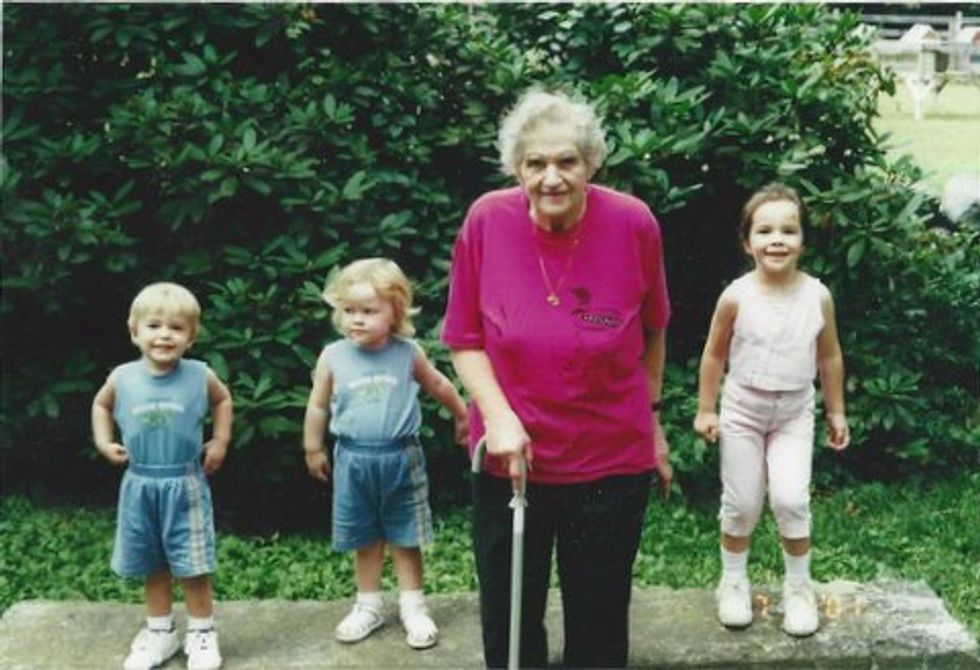Each time that I begin to write or speak to others about Alzheimer’s, I always have so many new things to say. In truth, I do not want anything more to say about it. I do not want to write about it for an audience, speak to my peers about why I need their dollars and time, or witness family, friends, and great minds in human history succumb to a cowardice disease hiding from our cure. I want there to be a solution, an end, a last and final case in the history of the world of Alzheimer’s disease, and I want to see it in my lifetime. While I wait for this day eagerly, I still need to speak and write and share with you, my reader, why I volunteer for the Alzheimer’s Association.
I was nine years old when my Nona, my mother’s mother, was diagnosed with Alzheimer’s. It’s not an appointment anyone wants to go to. Gradual changes in mood, everyday behavior, common ability, and, of course, memory, became evident in every way. It became impossible for my Nona to live safely and healthily at home without full-time care, which at that point was shared between my mother and my uncle. When my mother began looking at nursing homes that specialized in Alzheimer’s, my siblings and I went with her, and that was the first time I saw other people with Alzheimer’s, some in far advanced stages than my Nona. It was terrifying. I was too young to understand both the science and effect of Alzheimer’s, and all I saw everywhere were elderly people acting like children or playing with children’s toys or wandering aimlessly, mute, staring into the distance like they were lost in thought. To be lost in thought is one thing, and it happens to all of us often when we “zone out.” But to be lost in space, to not be able to retrieve a memory, is like a boat lost at sea. You can’t see land, you can’t remember how you got there, and no one is around to help you.
This is what scares me the most about Alzheimer’s. There are so many bad things about it, so many terrible moments of sadness mixed with fear mixed with anger at a sickness that hides within the pathways of the brain. You can’t just throw a bandage on this wound or prescribe a pill to take for two weeks and the problem goes away. It’s an invisible enemy that just won’t quit, and it does not discriminate against any race, religion, socioeconomic background, or level of education. Some of the most brilliant minds in the history of our world have lost these minds to Alzheimer’s, wandering around trying to understand simple things like brushing one’s teeth or dressing oneself.
But the person is not lost. The short-term memories are gone, plain and simple. Many memories from recent years are gone as well. But many long-term memories and inherent facts remain in the person, and that is what makes them truly themselves. Of course, my Nona came to a point when she did not call me by name, did not recognize me as her granddaughter, and did not recognize any of my siblings, parents, aunts and uncles, or cousins as relations to her at times. But I have held onto one hope all of this time. Even though she did not call me by name or by relation, she looked at me and knew it was me.
My mother would tell me it was time to go home for the day at the nursing home, and she would instruct me to put my face right in front of my Nona’s and say loudly that I was leaving, who I was, that I loved her, and I would be back tomorrow. I would say all of this with an elevated voice, and more often than not, Nona would look off into the scenery behind me, sometimes without saying anything, sometimes nodding, and sometimes saying “OK." Sometimes she would focus on my eyes, and I would focus on hers, and I knew for certain that she was absorbing what I was saying.
She knew I loved her and that I really would be back tomorrow, and that I was her granddaughter. I knew because Alzheimer’s doesn’t change a person’s eyes, at least not in the way that they tell you the truth of a person’s brain and love for others. Neither does a smile. The best things that Alzheimer’s never won from my Nona were her blue eyes and her simple, beautiful smile, a smile that said she loved your company and loved being with those that meant the world to her.
Memories are really a sacred group of beings all on their own and we take them for granted every single day. Perhaps you don’t want to remember a bad thing that happened to you today or you’d rather try not to remember when things didn’t go your way. But hold onto your best memories, especially those that make you think of your family or your closest friends and bring a smile to you, because memories can be lost in an instant down the road.
My other piece of advice would be to educate yourself more on Alzheimer’s disease and what it really means to both have it and care for someone who has it. It would be a mistake if I did not implore you to volunteer for the Alzheimer’s Association as well. This is a tangible opportunity to advocate for those who cannot advocate for themselves. It’s us against Alzheimer’s, and we must put up a good fight. In fact, we must put up a tremendous fight, or else people will continue to write these urgent messages for help and you will continue to read them and see people you know change because of that invisible enemy. Don’t let it win!





















